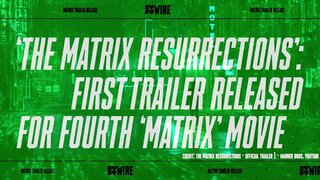Create a free profile to get unlimited access to exclusive videos, sweepstakes, and more!
Could We Be Living in a Simulation? The Science Behind The Matrix
Maybe! But probably not.
The late ‘90s were a weird time. Home computing became increasingly common and the internet hatched into existence, still gooey and ill-mannered. As we turned the millennial page, technology promised an unprecedented level of connectivity and opportunity. At the same time, Y2K loomed large, threatening to unravel everything we had made. Technology, it seemed, was the cause of and solution to a growing list of problems.
Enter the Wachowskis and their 1999 cyberpunk classic The Matrix, streaming now on Peacock! Behind the shiny leather and bullet casings was a cinematic examination of an age-old philosophical question: Can I trust the evidence of my senses? The Matrix asked viewers in no uncertain terms to at least consider the idea that they might be prisoners in an advanced simulation of reality.
The Matrix, Descartes, and Extreme Skepticism
The digital reality of The Matrix offered a flashier version of a long-running philosophical debate about the nature of existence. It ties back to French philosopher René Descartes and his famous axiom, “Cogito, ergo sum,” popularly translated as “I think, therefore I am.”
RELATED: How Do You Escape the Matrix?
Descartes employed radical skepticism toward his own experiences, reasoning that he couldn’t really know that anything he experienced was actually real. That line of reasoning drilled all the way down until Descartes doubted even his own existence, and that’s where he hit a wall. Doubting your existence requires doubt, which requires existence. Descartes ran up against what he considered to be the only knowable thing, that he existed. He reasoned that everything else was subjective and up for debate. After all, how can your brain tell the difference between actual reality and a series of electrical impulses which only appear like reality?
The Matrix so effectively drilled itself into the public consciousness because it presented Descartes' existential nightmare nestled comfortably inside of the world we already know.
The Argument That We’re Living in a Simulation
The Matrix didn’t invent the idea of simulation theory, but it did bring it to the masses in a way nothing had before. It didn’t hurt that, at the time, people all over the world were getting their hands on increasingly powerful home computers.
Over the intervening decades, as computing technology has continued to rapidly improve, the possibility of high-fidelity digital simulations looks increasingly possible. Consider today’s computers, graphics engines, and machine learning, then compare that with our technological capabilities just a few decades ago. Now extrapolate that progression into the future a few decades or a few centuries and imagine what might be possible.
It doesn’t feel unreasonable that we might transition from simulating Roller Coaster Tycoon to simulating reality. As the possibility of creating our own digital universes looms ever larger, we may have to reckon with the fact that we might be living in a simulation ourselves.
RELATED: The Matrix Full Quadrilogy is Streaming on Peacock Now
Proponents of simulation theory largely rely on a statistical philosophical argument that does something like this: 1) Assume humans (or some other human-level intelligence) survives its technological adolescence without being destroyed. 2) Along the way we build increasingly powerful computers which are eventually capable of simulating all or part of a universe, maybe even of our own past. 3) More than one simulation gets made.
If intelligent entities create one simulation they are likely to create more than one. Moreover, if the simulation is sufficiently representative of physical reality, then intelligence should arise inside of it, potentially creating their own simulations. The end result is one physical reality and multiple, maybe even infinitely nested, simulated realities. If we assume simulations are possible than we can assume there are a great many of them, and the probability that we find ourselves in the one true physical universe is vanishingly small.
This line of thinking leads to one of three possible conclusions about reality. Either civilizations never attain the capability to simulate reality, they do have the capability but they aren’t interested, or we are very likely living in a simulation right now.
The Argument Against Simulation Theory
Critics of simulation theory rightly point out that the entire notion is unscientific. Sure, it’s a fun thought experiment and we can create some compelling arguments, but that’s about where it ends. If we’re dealing with a simulation which, by design, perfectly mimics the physical universe, then we can’t ever know that we’re being duped. Moreover, if it’s indistinguishable from the real universe, then what does it even mean to be real?
Not to mention that even if we did figure out that we’re in a simulation, that knowledge could be removed from us in software. Ultimately, the question is untestable, which places it outside the purview of scientific experimentation. At least for now.
RELATED: Keanu's best action movies, ranked from 'The Matrix' to 'John Wick'
Simulation theory also assumes that any simulations must have conscious actors inside. If we’re already assuming intelligent creatures capable of simulating reality, there’s no reason to assume they couldn’t make us mindless NPCs. One could also make a philosophical argument that investigating the question is inherently dangerous. If we created simulations of people to see what they’d do, figuring out they’re in a simulation might be cause for killing the sim. Basically, when someone groks that they’re in the Matrix, the machines send in agents to fix the problem. Thinking too much about simulation theory could be bad for your health, digital as it might be.
The real kicker, however, is the mathematical argument that got us here in the first place. It presents an infinite number of realities, only one of which is real, and asks if it’s likely that we’re in the real one or one of the nearly infinite number of simulations. When framed that way, the answer seems clear: We are obviously in a simulation. But the same situation can be presented another way.
Suppose some intelligence did create a simulation with living things inside it. Then they created their own simulations with people inside, and so on forever, with new simulations constantly being created at the lowest nested level. It is statistically unlikely that we are in the one true universe at the top, but it’s equally unlikely that we’re in reality at the bottom that hasn’t yet created its own simulations. If we really are inside one of an infinite number of simulated realities, then we should be able to make our own Matrix, but we can’t. Odds are, we’re on our own out here.
At least we’re in the one universe where The Matrix and all of its sequels are streaming on Peacock.
































